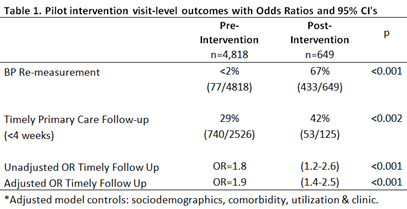Session Information
Date: Sunday, November 8, 2015
Title: Health Services Research Poster I: Diagnosis, Management and Treatment Strategies
Session Type: ACR Poster Session A
Session Time: 9:00AM-11:00AM
Background/Purpose: Hypertension is the most common and
most modifiable cardiovascular disease (CVD) risk factor, yet it is
uncontrolled in ½ of US adults. Hypertension management protocols are predicted
to save more lives than any other systems intervention. However, hypertension protocols
are untested in most specialty clinics. Our prior work reported that
rheumatologists addressed high blood pressures (BP) in <1/3 of visits,
highlighting the need for effective population management strategies given the
link between many rheumatologic conditions and CVD. Our objective was to pilot
a protocol intervention to facilitate timely primary care follow up for patients
with elevated BP readings at rheumatology visits.
Methods: We implemented a pre-post intervention pilot
at three academic rheumatology clinics. All adult (≥18 years-old) rheumatology
patient visits with BP ≥140/90 during the intervention period (Nov 2014-May
2015) were compared to all pre-intervention visits with BP ≥140/90 (Jan 2012-Sept
2014). Intervention elements included: (1) Defining elevated BP (≥140/90)
and rheumatologic CVD risk for the medical assistant/nursing staff (45 min
education) and patients (BP brochure), (2) electronic health record (EHR) alerts
for staff to re-measure BPs if ≥140/90 (3) EHR prompting brief patient education
and timely follow-up order if 2nd BP confirmed ≥140/90, and (4)
individualized feedback for patients (BP recorded on brochure) and staff
(monthly audit feedback). We assessed the primary outcome of timely (<4
weeks per Medicare metric) blood pressure follow-up in primary care among patients
who received regular primary care in this system allowing EHR tracking. We
performed a multivariate logistic regression to compare the bivariate timely primary
care follow up outcome pre-post intervention controlling for baseline sociodemographics,
comorbidities, visit utilization and rheumatology clinic.
Results: We compared the post-intervention cohort of
649 visits with elevated BPs (≥140/90) to 4,818 visits pre-intervention with
elevated BPs. Pre-intervention, <2% of visits had BPs re-measured, versus
67% of post-intervention visits, p<0.001. Among patients receiving primary
care within the system, 42% of post-intervention patients with confirmed high
BP completed timely primary care follow-up versus 29% pre-intervention, p=0.002.
In multivariate logistic regression, the post-cohort had nearly two-fold higher
odds of timely follow-up (OR 1.9, 1.4-2.5).
Conclusion: Our intervention supported usual care rheumatology
clinic staff to improve timely BP follow up as a population management strategy
to reduce CVD risk in rheumatology patients. We plan to examine the impact of
the intervention on patients’ awareness of CVD risk, subsequent BP management,
and hypertension control. Future work will adapt and test this intervention in
other specialties and healthcare systems.
To cite this abstract in AMA style:
Bartels CM, Ramly E, Johnson H, Zhao Y, Li Z, McBride P, Steffen Lewicki K, Lauver D. Improved Follow-up of Hypertension in Rheumatology Patients: Results of a Pilot [abstract]. Arthritis Rheumatol. 2015; 67 (suppl 10). https://acrabstracts.org/abstract/improved-follow-up-of-hypertension-in-rheumatology-patients-results-of-a-pilot/. Accessed .« Back to 2015 ACR/ARHP Annual Meeting
ACR Meeting Abstracts - https://acrabstracts.org/abstract/improved-follow-up-of-hypertension-in-rheumatology-patients-results-of-a-pilot/

